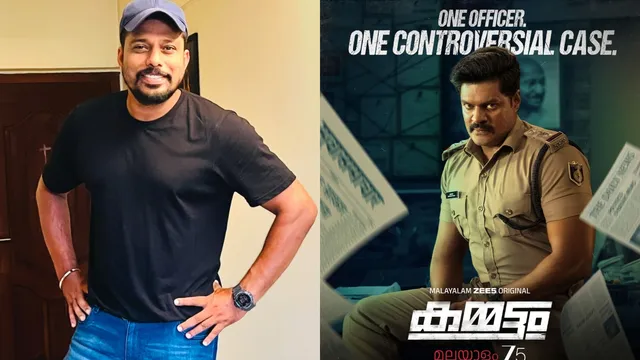- By Parina Taneja
- Tue, 19 Aug 2025 05:21 PM (IST)
- Source:JND
Director Shan Thulasidharan has marked a significant shift from the heartwarming world of the 2023 Malayalam movie Dear Vaappi to the gritty, suspenseful world of Kammatam. Set to debut as ZEE5 Malayalam's first original series on September 5, Kammatam is a crime thriller inspired by the sensational cooperative bank scams that once rocked Thrissur. Talking about his journey, Thulasidharan revealed in an exclusive conversation with The Daily Jagran that while Dear Vaappi was a feel-good story, his true passion lies in thriller-style storytelling. He was drawn to the real-life Thrissur incidents because they provided a canvas to explore layers of crime, politics, and human drama, making the narrative both authentic and relatable.
Kammatam director Shan Thulasidharan emphasises his focus on authenticity over sensationalism, crafting a story that respects the 'lived realities' of the people involved. With the Zee5 series, he hopes to encourage viewers to look beyond the headlines and understand the complexities of human ambition and vulnerability that lead to a breach of public trust. Let's get the insights about his process of making Kammatam and the shift to this genre.
From the heartfelt family drama of Dear Vaapi to a gritty crime series like Kammatam, what has this genre-hopping journey been like for you as a director?
Dear Vapi is a feel-good film that beautifully captures the bond between a father and daughter. In contrast, Kammattam is rooted in the thriller series, with Officer Antonio George at its core, embarking on a gripping journey to uncover the truth behind a murder. I have always been drawn to thriller-style storytelling, so directing this series was an exciting and fulfilling experience.
Kammatam series is based on the real-life cooperative bank scams in Thrissur. What about this incident made you feel it needed to be told as a series?
This story weaves together the infamous crime that shook Thrissur with several other real-life incidents that have unfolded around us. Blending these elements creates a narrative that feels both authentic and relatable, ensuring the audience instantly connects with its characters, emotions, and the world it portrays.
How did you approach weaving together the layers of crime, politics, and human drama to create a compelling narrative without sensationalising the real events?
In crafting Kammatam, my approach was rooted in authenticity rather than sensationalism. I began by deeply understanding the core events and the human stories behind them, focusing on the emotions, motivations, and moral dilemmas of the people involved, rather than just the crime itself. Every layer - crime, politics, or personal conflict- was treated as an organic extension of the characters' journeys. We created a gripping story that remains truthful without exploiting the actual incidents by grounding the narrative in lived realities, keeping the tone respectful, and allowing the silences and subtleties to speak as loudly as the twists.
Kammatam is a story of a breach of public trust. Beyond the headlines, what do you hope the audience takes away about the complexities of these events?
Beyond the headlines, I hope the audience understands that incidents like the one depicted in Kammatam are rarely black and white. They are shaped by layers of human ambition, vulnerability, and circumstance. A breach of public trust doesn't happen overnight; it results from choices, compromises, and systemic gaps that people exploit. Through this story, I want viewers to reflect on how easily trust can be broken, its ripple effects on communities, and the importance of vigilance and accountability in protecting what belongs to the public.
As a director, how do you find and develop the "human" element in a story heavily rooted in crime and political intrigue?
No matter how big the backdrop of a story is, the "human" element makes any story truly resonate. In Kammatam, I focused on each character's emotions, motivations, and vulnerabilities; what drives them, what they fear, and how they justify their actions to themselves. Crime and politics are the framework, but it's the personal stakes, relationships, and moral dilemmas that make the audience connect. By grounding every twist in genuine human behaviour, the story feels authentic and layered, allowing viewers to see the crime and the people behind it.
For Shan Thulasidharan, crime and politics may be the framework, but it is the personal stakes and moral dilemmas that make a story truly resonate with an audience. With Kammatam, he aims to create a deeply human story that exposes not just the crime, but the people behind it.

